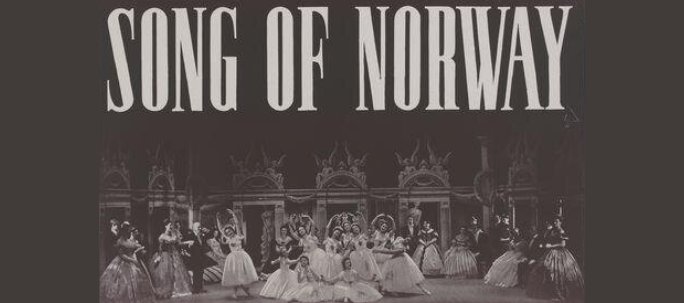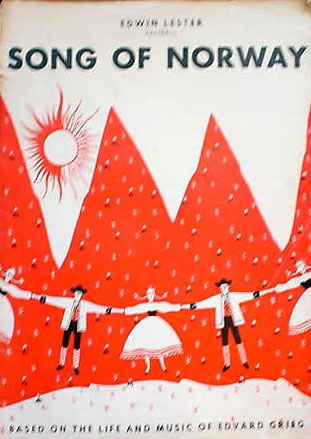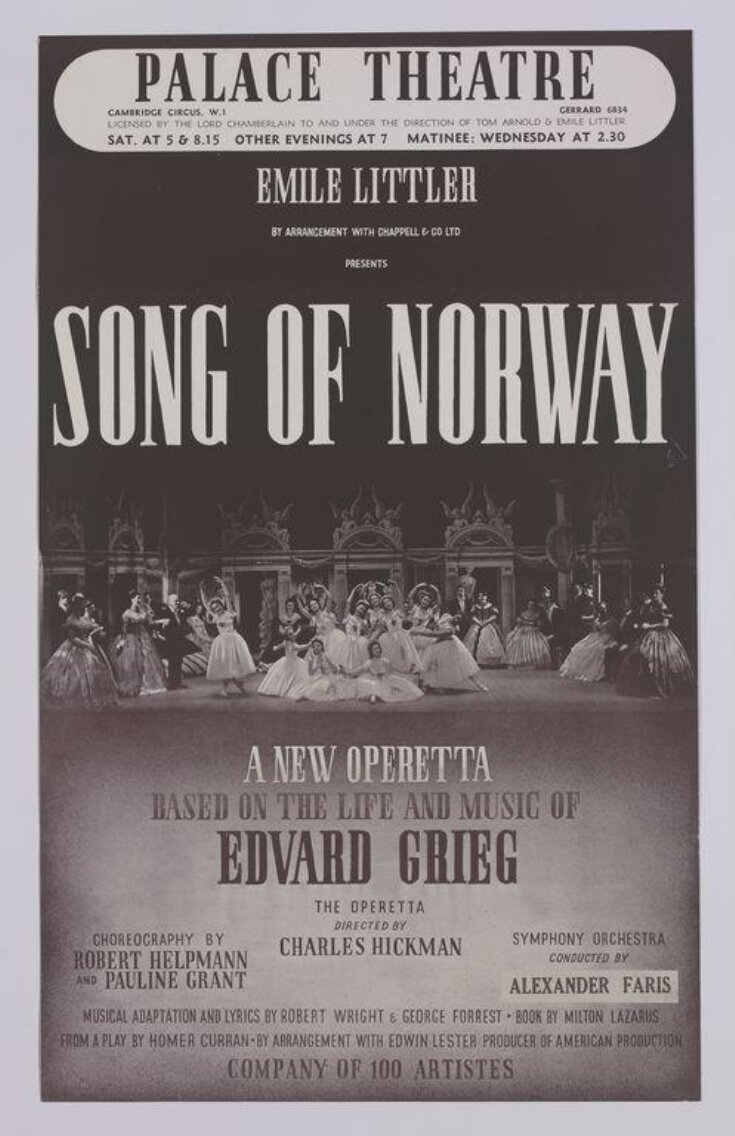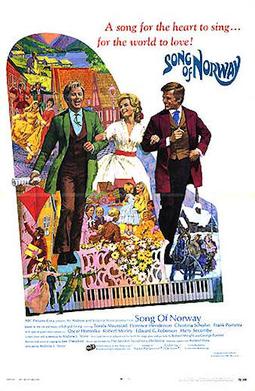Song of Norway
Musical (1944)

Song of Norway est un musical-opérette écrit en 1944 par Robert Wright et George Forrest, adaptée de la musique d’Edvard Grieg, avec un livret de Milton Lazarus et Homer Curran. Il s’agissait d’un de ces musicals retraçant la biographie de grands compositeurs, un genre très apprécié par Broadway et Hollywood.
Avant Broadway, Song of Norway avait connu un grand succès à Los Angeles et à San Francisco. Le producteur Edwin Lester a décidé de proposer la production intacte à New York pendant les chaudes journées d’août 1944. Il a reçu des critiques étonnamment bonnes et le spectacle est devenu un succès grâce au public.
Le spectacle a aussi été présenté à Londres pendant 526 représentations au Palace Theatre, le premier spectacle de Broadway à traverser l’Atlantique après la fin de la Seconde Guerre mondiale.
Song of Norway avait pour but de raconter la vie du compositeur norvégien Edvard Grieg, joué par Lawrence Brooks. Dans son petit village, il courtise Nina Hagerup, qui deviendra plus tard sa femme, et est l’amie de Rikard Nordraak, un poète qui écrit sur leur pays natal. C’est là qu’intervient un personnage inventé, la tempétueuse étoile d’opéra Louisa Giovanni. Elle convainc Grieg d’aller avec elle à Rome, où il sera sans doute inspiré à écrire de la musique dans la grande tradition européenne plutôt que de composer une musique qui reflète le folklore et les légendes de son pays natal. Mais à Rome, Grieg finit par se rendre compte qu’il n’est pas fidèle à son moi musical. Et la mort de Rikard le conduit à réaliser qu’il doit retourner à ses racines norvégiennes. Au final, le musical raconte les luttes d’Edvard Grieg et ses tentatives de développer une musique nationale norvégienne authentique.
Prelude
"The Legend" (adapté du Grieg's A-Minor Concerto) (Orchestra)
"Hill of Dreams" (A-Minor Concerto) (Helena Bliss, Lawrence Brooks, Robert Shafer);
Acte I
"In the Holiday Spirit" (dance) (Dancing Peasants)
"Freddy and His Fiddle" ("Norwegian Dance") (Kent Edwards, Janet Hamer, Frederic Franklin, Singing Townspeople)
"Now" (Waltz Opus 12, Number 12; and the Violin Sonata No. 2 in G Major) (Irra Petina, Townspeople)
"Strange Music" ("Nocturne" and "Wedding in Troldhaugen") (Lawrence Brooks, Helena Bliss)
"Midsummer's Eve" (""Twas on a Lovely Eve in June" and "Scherzo") (Robert Shafer, Irra Petina)
"March of the Trollgers" (aka "The Cake Lottery") ("Mountaineers' Song," "Halling" in G Minor, and "March of the Dwarfs") (Entire Ensemble)
Finale of Act One: (a) "Hymn of Betrothal" ("To Spring") (Ivy Scott, Villagers); (b) "Strange Music" (reprise) (Lawrence Brooks, Helena Bliss, Chorus); and (c) "Midsummer's Eve" (reprise) (Robert Shafer,
Helena Bliss, Chorus)
Acte II
Introduction—"Papillon"; "Bon Vivant" Part | ("Water Lily") (Lawrence Brooks, Girls) and "Bon Vivant" Part II ("The Brook" from the Haugtussa Cycle) (Sig Arno, Lawrence Brooks, Sonia Orlova, Girls)
"Three Loves" ("Albumblatt" and "Poem Erotique") (Irra Petina, Lawrence Brooks)
Finaletto: (a) "Down Your Tea" ("Springtide") (Irra Petina, Faculty Members, Guests); (b) "Nordraak's Farewell" ("Springtide") (Robert Shafer); and (c) "Three Loves" (reprise) (Irra Petina, Helena Bliss, Ensemble);
"Chocolate Pas de Trois" ("Rigaudon* and "From Monte Pinco") (Frederic Franklin, Employees)
"Waltz Eternal" ("Waltz Caprice") (Ladies and Gen- tlemen)
"Peer Gynt": (a) "Solvejg's Melody"; (b) "Hall of the Dovre King"; and (c) "Anitra's Dance" (Ballet of the Italian Opera)
"I Love You" ("Ich Liebe Dich") (Helena Bliss)
"At Christmastime" ("Woodland Wanderings") (Philip White, lvy Scott, Helena Bliss)
"Midsummer's Eve" (reprise) (Lawrence Brooks, Helena Scott)
"Strange Music" (reprise) (Lawrence Brooks, Helena Bliss)
"The Song of Norway" (Piano Concerto) (Lawrence Brooks, Ballet Dancers)
Aucun dossier informatif complémentaire concernant Song of Norway
Aucun dossier informatif complémentaire concernant Song of Norway

Version 1
Song of Norway (1944-08-Imperial Theatre-Broadway)
Type de série: OriginalThéâtre: Imperial Theatre (Broadway - Etats-Unis)
Durée : 2 ans 2 semaines Nombre : 860 représentationsPremière Preview : 21 August 1944
Première: 21 August 1944
Dernière: 07 September 1946Mise en scène : Charles K. Freeman • Chorégraphie : George Balanchine • Producteur : Star(s) : Avec: Janet Hamer (Sigrid), Kent Edwards (Einar), Robert Antoine (Eric), William Carroll (Gunnar), Patti Brady (Grima), Jackie Lee (Helga), Robert Shafer (Rikard Nordraak), Helena Bliss (Nina Hagerup), Lawrence Brooks (Edvard Grieg), Walter Kingsford (Father Grieg), Philip White (Father Nordraak), lvy Scott (Mother Grieg), Frederic Franklin (Freddy), Sig Arno (Count Peppi Le Loup), Irra Petina (Louisa Giovanni), Ewing Mitchell (Faculty Member), Audrey Guard (Faculty Member), Paul De Poyster (Faculty Member), Lewis Bolyard (Inn Keeper), Doreen Wilson (Frau Professor Norden), Sharon Randall (Elvera), Karen Lund (Hedwig), Gwen Jones (Greta), Ann Andre (Marghareta), Elizabeth Bockoven (Hilda), Sonia Orlova (Miss Anders), Dudley Clements (Henrik Ibsen), Frederic Franklin (Tito), Robert Bernard (Maestro Pisoni), Cameron Grant (Butler), Alexandra Danilova (Adelina), Nora White (Maid), Barbara Boudwin (Signora Eleanora); Children: Sylvia Allen, Grace Carroll, Pat O'Rourke, Shannon Randolph; Dancing Peasants, Employees of Tito's, The Ballet of the Teatro Reale (The Italian Opera Ballet Company), and the Characters of the Fantasy: Performed by the artists of the Ballet Russe de Monte Carlo (Sergei J. Denham, Director): Alexandra Danilova, Frederic Franklin, Nathalie Krassovska, Leon Danielian, Maria Tallchief, Ruthanna Boris, Alexander Goudovitch, Mary Ellen Moylan, Serge Ismailoff, Anna Istomina, Nicholas Magallanes, Michael Katcharoff, Julia Horvath, Peter Deign, Allan Banks, Herbert Bliss, Vida Brown, Alfredo Corvino, Pauline Goddard, Helen Kramarr, Karel Shook, Gertruda Swobodina, Nikita Talin, Nora White; Singing Peasants, Guests and Faculty at Copenhagen, and Guests at the Villa Pincio: Performed by the Singing Ensemble of the Los Angeles and San Francisco Civic Light Opera Company: Girls—Ann Andre, Elizabeth Bockoven, Barbara Boudwin, Mary Bradley, Shirley Conklin, Kaye Connors, Audrey Dearden, Audrey Guard, Leone Hall, Gwen Jones, Karen Lund, Sharon Randall, Margaret Ritte, Mary Walker, Doreen Wilson; Boys— Robert Bailes, Lewis E. Bolyard, Frank Brenneman, John Chaloupka, Paul de Poyster, Cameron Grant, Larry Haynes, Hal Horton, Raymond Keast, Hal McMurrin, Arthur Waters, Maurice Winthrop, Stanley Wolfe, Walter YoungCommentaires : Imperial Theatre: 21 août 1944 - 13 avril 1946
Broadway Theatre: 15 avril 1946 - 7 septembre 1946

Version 2
Song of Norway (1946-03-Palace Theatre-London)
Type de série: Original LondonThéâtre: Palace Theatre (Londres - Angleterre) Durée : 1 an 1 mois 2 semaines Nombre : 526 représentationsPremière Preview : 07 March 1946
Première: 07 March 1946
Dernière: 26 April 1947Mise en scène : Charles Hickman • Chorégraphie : Robert Helpmann • Pauline Grant • Producteur : Star(s) : Avec: Janet Hamilton-Smith (Louisa Giovanni), John Hargreaves (Edvard Grieg), Arthur Servent (Rikard), Halina Victoria (Nina Hagerup), Bernard Ansell (Count Peppi Le Loup), Olive Sturgess (Mrs Grieg), Colin Cunningham (Grieg), Jan Lawski (Freddy), Moira Fraser (Adelina), John Pygram (Tito)

Version 3
Song of Norway (1970-11-Film)
Type de série: FilmThéâtre: *** Film (*** - ***) Durée : Nombre : Première Preview : Inconnu
Première: 04 November 1970
Dernière: InconnuMise en scène : Andrew L. Stone • Chorégraphie : Producteur : Star(s) : Avec: Toralv Maurstad (Edvard Grieg), Florence Henderson (Nina Grieg), Christina Schollin (Therese Berg), Frank Porretta (Richard Nordraak), Harry Secombe (Bioernstjerne Bjoernson), Robert Morley (Berg), Edward G. Robinson (i) (Krogstad), Elizabeth Larner (Mrs. Bjoernson), Oskar Homolka (Engstrand), Frederick Jaeger (Henrik Ibsen)Commentaires longs: Le 6 septembre 1946 (un jour avant la fermeture du musical à Broadway), Universal a annoncé l’achat des droits d’écran pour 200.000$ plus 25 % des bénéfices du film. Le studio prévoyait que l’adaptation cinématographique soit produite en Technicolor par Sam Spiegel (alors connu sous le nom de S.P. Eagle) et qu’elle mettrait en vedette Deanna Durbin, le tournage devant commencer en janvier 1948. Cependant, en raison d’un budget élevé prévu et d’un problème fiscal connexe qui freinait les exportations de films hollywoodiens vers la Grande-Bretagne, M. Eagle a révélé le 21 août 1947 que le film était reporté indéfiniment.
Pas encore de video disponible pour ce spectacle